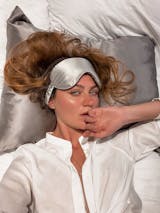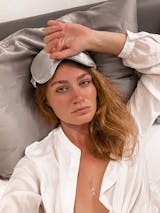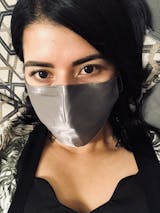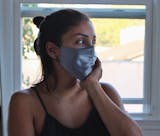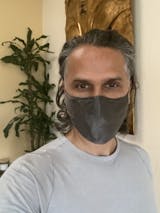Having acne can really affect a person’s life. Anyone who has suffered, or is suffering from acne knows all too well the struggles of trying to treat, manage, and stop it altogether. Often we find ourselves down a Google rabbit hole trying to figure out ways to stop our skin from breaking out.
But there are quite a number of well-known facts about acne out there that are a cause for concern. These are facts that have little to no scientific evidence to back them up, and are often false, misleading, ineffective, or can cause your skin significant damage.
In this article, I’m going to highlight the biggest myths about acne; and some sustainable skincare products you can use to treat acne.
Overloaded with Misinformation
We are the most informed—and ill-informed generation, thanks to the internet. We can find the answer to any question we have at the click of a button, or simply by asking our mobile device “Hey Siri!”. But do you ever fact-check the answer you get with other sources? Or do you take the first website you clicked on as gospel?
Google and social media have become our biggest sources of information. In fact, 53% of Americans get their news from social media (1), and most of us use Google on average three times a day to search for information on anything and everything from the news, to medical symptoms, to pop culture, to events—literally everything.
But for those of us who have an audience, there also comes a responsibility for us to give people true information, which is something that many websites lack.
The biggest problem with the internet is that it is unfiltered. There is nobody regulating and fact-checking people’s websites. If someone owns their own website they can put whatever opinions they have on there. And if they’re a whiz at SEO, they’ll rank high in the search engine results.
Biggest Myths About Acne
Let’s dive into the most common myths about acne, and why they’re problematic.
Only teenagers get acne
If you’re reading this, I’m assuming you have acne, and the chances are you’re not a teenager anymore. Nobody is exempt from acne. It comes down to two main factors:
- Genetics
- Hormones (8)
- Medication
- Stress (7)
If you’re genetically predisposed to acne, then this is something you may experience all your life. Hormonal acne only flares up during hormonal periods, when we’re an adolescent, pregnant, people with polycystic ovary syndrome (PCOS), and sometimes when we have menopause. Medications that disrupt the hormonal balance, or give you a reaction can cause acne. And stress can also exacerbate acne.
For people who believe this is a teenage condition, it can cause some distress if they feel like they are not “supposed to” be experiencing acne because they are an adult. These feelings can create more stress, which, as I just mentioned, is another cause for worsening acne.
Instead, embrace it. Some adults will get acne (5). In fact, 50 million Americans do (6). So you’re not alone, not even a little bit. And there are so many treatments for it out there. The first port of call should be using high quality, sustainable skincare that does you and our planet no harm.
Acne is Caused by Dirt
This is quite possibly the biggest myth I’ve seen. When we falsely believe that our acne is due to our skin not being “clean enough”, it can cause all kinds of issues. Let’s first talk about why acne is not dirty.
Acne comes from our sebaceous glands. When we have overactive sebaceous glands, they produce and secrete more sebum and oil than normal. Our skin is also constantly sloughing the outermost layer—the stratum-corneum—of dead skin cells off. This is how our skin keeps regenerating and healing. But it takes up to four weeks to completely slough the entire outer layer.
So when we are producing more than normal amounts of sebum than our skin can handle—due to hormones, or whatnot—sometimes it becomes trapped under dead skin that has yet to be sloughed off, and this can create acne.
The problem with believing that our skin is not clean, is that we tend to over-cleanse and over-exfoliate the skin in a bid to remove or minimize acne. But this does the exact opposite. The more you over-cleanse, the more you’re taking away the protective layers from our microbiome, acid mantle, and lipid barrier of our skin.
What then happens is there is nothing there to protect the skin from free radical damage, pollution, and external aggressors, and our skin becomes vulnerable. You will then be met with secondary acne symptoms; inflammation, redness, dryness, and—gulp—premature aging.
In order to avoid this from happening, you should be using a gentle cleanser, and then only exfoliate once or twice a week using chemical exfoliants with a gentle AHA or enzyme, so you don’t irritate the skin with abrasive manual scrubbing.
Try Enlighten Retexturizing Glycolic Treatment, with rose water, glycolic acid, sandalwood, hibiscus, and turmeric for resurfacing, brightening, calming, and healing the skin.
Your Diet Doesn’t Affect Your Skin
I remember in High School my grandmother telling me not to eat chocolate because it was causing my acne. I never ate chocolate all that often, yet my acne was constant, so I knew this wasn’t true for me. But I have friends who have experienced otherwise.
There have been studies done on this subject over the last few decades, and there are conflicting reports out there. But one thing is certain, the relationship your diet has on acne is not a black and white case.
Some reports state that a diet high in dairy, high glycemic index foods, greasy or oily foods, and chocolate can affect sebum production (2). But then there are other studies that claim the evidence is not clear enough, as the results could be subjective to each participant in the study depending on their beliefs, or their particular genetic makeup (3).
But if our diet can cause other physical ailments, such as gut inflammation, then it’s safe to say that our skin is more than likely to be affected by our diet, too. So to give your skin the best shot at clear, glowing skin, eat less processed foods and sugars, eat more fruits and vegetables, and eat everything in moderation.
Popping Pimples Clears Them Faster
It’s tempting to pop a pimple that has grown into a white volcano. But you should really try and refrain from touching them, as most of us aren’t taught how to properly extract pimples and blackheads.
Three main reasons why you shouldn’t do it are:
- You could force the infection through the follicle wall, causing it to spread to neighboring follicles, thus creating a new pimple, or a monster pimple, which prolongs the life of that breakout.
- You can create a larger infection, redness, and inflammation.
- You can cause scarring (4).
The best defence is to leave it alone, keep it clear from makeup, and use products that speed up the healing process, like the Helios Anti-Pollution Youth Ampoule. Read more about acne scarring here.
Sun Kills Acne
Another myth that I’ve seen a lot of people mention is how the sun kills acne. While the sun is antibacterial, it won't “kill” acne. As mentioned before, acne is an internal condition caused by genetics and hormones. But spending time in the sun in order to try and reduce your acne can cause UV damage instead, which leads to premature aging and hyperpigmentation.
Another reason why you should avoid the sun if you have acne is, the sun can cause any fresh or pink scarring you have to turn brown. So if you’ve just popped a pimple, you’ll have fresh scar tissue, so if you go outside without wearing SPF, that scar tissue will eventually darken and leave a noticeable mark. Always wear SPF30+ when you’re outside.
Toothpaste Stops Pimples
Have you heard the trick of using toothpaste on your pimples? There are some ingredients in toothpaste, like baking soda or hydrogen peroxide, which are known to have drying properties. This can minimize pimples, but it is not advisable by many skin specialists.
Toothpaste contains varying ingredients that are too harsh for the skin. Baking soda and hydrogen peroxide are both abrasive on the skin. Not to mention menthol in toothpaste can further irritate the skin.
If you’re looking for treatment for pimples, opt for a face mask like Catharis Face Mask. It contains aloe leaf, neem, spirulina, chlorella, and orange peel to help with inflammation, hyperpigmentation, and breakouts.
Pores Can Be Closed
When a brand says that their product can “close” your pores, this is purely marketing. Our pores never close, and they are always the same size. But when they are blocked, they can appear larger.
The best way to combat large-looking pores is to perform a ritual that manages the sebum production of your skin. A gentle double cleanse using an oil-based cleanser, like Sunshine Dew by Earth Harbor, followed by a gentle second cleanser, such as the Pa’akai Cleansing Cream; and then followed with a serum that helps with congestion. I recommend Nebula Adaptogen Clarity Ampoule, it contains sea lavender, ginseng, and squalene to balance sebum and nourish the skin.
Makeup Causes Acne
Makeup does not “cause” acne, but it can cause blackheads and clogged pores. This is because it can create a barrier, so any sebum within the follicles gets caught in the pores, creating a plug.
Follow a gentle ritual every night to remove makeup, which, as mentioned before, includes a double cleanse. Follow with a serum and a hydrating moisturizer.
Moisturizers Cause Acne
It can feel counterintuitive to moisturize acne-prone skin, especially if you have oily skin. But it is an important step in a ritual, as it gives your skin the nourishment and hydration it needs so it doesn’t need to over-produce sebum.
You can certainly choose the wrong moisturizer, though. Normal skin is usually ok with any type of moisturizer, depending on the specific preferences of the person. For oily skin, skin needs hydration without over-nourishing the skin, as this can cause blockages. Dry skin needs a lot more nourishment and protection from drying out. Combination skin will vary depending on whether it is combination-dry, or combination-oily. Again, this is also usually a personal preference.
Here are some moisturizers from some of our favorite sustainable beauty brands:
Normal/Dry/Combination-Dry: Māhealani - Moonlit Glow Balm
Normal/Dry/Combination-Dry: Illume | Radiance Enhancing Moisturizer
Normal/Oily/Combination-Oily: Ambrosia de Cerrado Lightweight Moisturizer
Normal/Oily/Combination-Oily: Yasuni Face Balm
Normal/Oily/Dry/Combination: Face Moisturizer with Argan
Conclusion
Whether you’re struggling with acne now, or you experience it later in life, understand that it is just a response to your body’s internal workings. Believing myths about acne can do your skin more harm than good. The best way to manage acne is with a little love and care, and using good quality, clean and sustainable skincare.
Emma Masotti is an Australian now living in Austin, TX, and has been a trained esthetician for over 15 years. She is a sustainable skincare writer, educating and building awareness around proper skin health that doesn’t cost the earth.
Some of the products promoted in our blog are from our online store. Many others are brands we have researched and found to be great examples of sustainable, ethical, and innovative brands in their field, and we don't make any profit from mentioning them in our blog. #CollaborationOverCompetition
References:
1. https://letter.ly/how-many-people-get-their-news-from-social-media/
2. https://pubmed.ncbi.nlm.nih.gov/33462816/
3. https://www.ncbi.nlm.nih.gov/pmc/articles/PMC2836431/
4. https://www.ncbi.nlm.nih.gov/books/NBK279208/
5. https://www.ncbi.nlm.nih.gov/pmc/articles/PMC5788264/
6. https://www.aad.org/media/stats-numbers
7. https://www.ncbi.nlm.nih.gov/pmc/articles/PMC5722010/
8. https://pubmed.ncbi.nlm.nih.gov/21763298/




